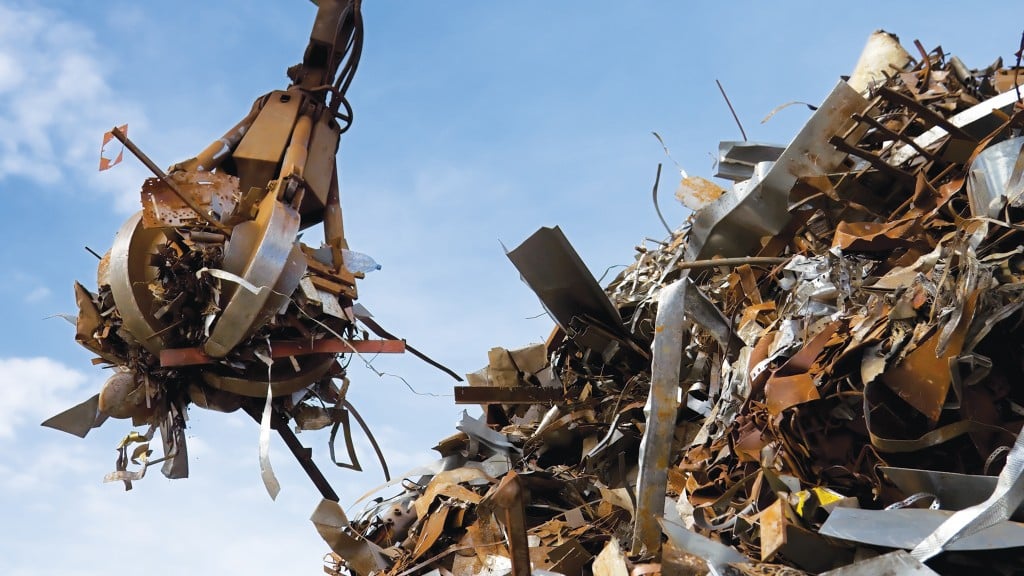7 ways to prevent rust and corrosion on scrap metal during winter
Simple strategies for keeping scrap metal clean and dry in wet weather

Winter weather poses significant challenges for scrapyards —primarily the rust and corrosion of scrap metal. Exposure to moisture, freezing temperatures, and changing weather accelerates these issues, weakening the structural integrity of metals and requiring more extensive cleaning, which can quickly drive up costs and lower profitability.
Damaged metals not only lose their market value, but also require additional processing to meet buyer specifications. This extra work increases labour costs, eating into profits. Heavily corroded metals can even be rejected by mills or buyers, resulting in lost revenue and wasted material for recyclers.
To combat these challenges, proper care and maintenance during the cold, wet months are essential. Taking proactive steps to protect scrap can help recyclers preserve metal quality, maintain its resale value, and minimize processing costs. Here are seven strategies to help safeguard your scrap metal through the winter season.
1. Invest in proper storage solutions
Proper storage is the first line of defense against rust and corrosion in the winter. Scrap metal left exposed to snow, rain, and ice is at risk of oxidizing, which can quickly reduce its value. An easy solution is to store materials in enclosed buildings or under other covered structures.
Another simple best practice is to keep scrap off of the ground by using platforms or wooden pallets. This prevents water from pooling underneath the metals, especially during heavy rainfall or when snow begins to melt. This also makes operations more efficient, since sorting and processing dry, corrosion-free scrap is substantially faster and easier than dealing with rusted and frozen scrap.
2. Sort metals properly
Separating ferrous and non-ferrous metals can prevent unnecessary damage during winter storage. Ferrous metals like iron and steel are prone to rust, while non-ferrous metals such as aluminum and copper are less reactive but can still corrode in wet conditions. Mixing these metals can speed up corrosion in ferrous metals and may also result in corrosion when moisture causes a reaction between dissimilar metals. Properly separating metals not only protects their value, but also makes downstream processing more efficient.
3. Use rust-resistant coatings
Applying protective coatings is an effective way to protect scrap metal from rust and corrosion. These coatings create a barrier between the metal and moisture, reducing the risk of oxidation and preserving material quality. Rust inhibitors, like anti-corrosion sprays, oils, or waxes, offer a convenient (but temporary) solution, especially during storage or transportation.
4. Cover metal with tarps
If covered storage isn't available, heavy-duty tarps can act as an alternative for protecting scrap metal from the elements. Choose tarps made from durable, waterproof materials like polyethylene or UV-resistant canvas. Tarps should be tightly fastened using bungee cords, ratchet straps, or weights to keep them in place and prevent wind from exposing the scrap. While it's not a permanent solution, tarps can significantly reduce rust and corrosion when indoor storage is limited.
5. Monitor and manage moisture
In enclosed spaces, dehumidifiers are effective for controlling humidity and minimizing the risk of moisture-related damage. For open spaces, moisture-absorbing products like dehumidifier bags and desiccants can be placed near metal piles to help reduce humidity in the air. Proper ventilation is also crucial — fans can improve airflow, preventing moisture buildup.
6. Perform regular inspections and maintenance
By frequently checking scrap metal inventory and storage areas, scrapyards can catch early signs of issues like rust spots, tarp damage, or pooling water. Setting up a consistent inspection schedule ensures that rust, moisture, and storage conditions are closely monitored. If rust is detected, it should be treated immediately to prevent further damage, using tools like wire brushes, rust removers, or sanders, and then reapplying protective coatings.
Winter weather can also affect the machinery used to handle scrap, so it's important to winterize equipment like material handlers and shredders, ensuring they are free from moisture to prevent downtime.
7. Educate employees on best practices
Training employees on winter-specific maintenance and storage techniques is vital to reducing rust and corrosion risks. Holding meetings or handing out guides on proper metal handling and storage practices ensures that everyone is on the same page when it comes to keeping metals dry and clean during processing.
Assigning specific roles, such as applying coatings, securing tarps, or monitoring moisture levels, helps simplify the process. By including staff in the rust and corrosion prevention process, scrapyards can improve overall operational efficiency.


